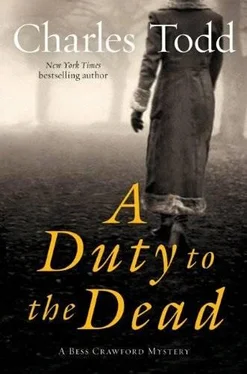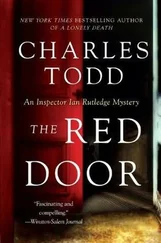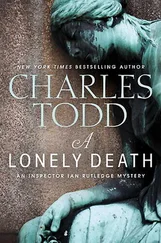I didn’t try to explain that shell shock didn’t begin with a physical wound.
She excused herself, and I went to my room, to write to my parents, then realized that I’d be giving my father an excuse to come and rescue me. Shell shock, murder, inquests-the Colonel Sahib couldn’t have stayed away. If need be, he’d bring the Household Cavalry with him.
I had packed my belongings the night before but didn’t have the spirit to take them out again. Instead I sat at the desk by the windows of my room and began a letter to Elayne. When it was finished I left it on the silver salver on the little French table in the hall, where someone would see that it was posted.
After that, what to do with myself? I opened the door of the house and stepped out, looking at the sky. To my surprise the clouds had broken, the winds had died down, and after the long spell of frosts and cold, the day was warming quickly. I went up to my room, collected my coat and hat and gloves, and set out for a walk.
As I did, I saw Mrs. Denton and her daughter leaving the rectory. Arranging poor Ted Booker’s services, I thought. I would have liked to offer them my sympathy.
This was my first opportunity to observe Sally. She appeared to be a little younger than I was, but she had a small son and was now a widow. I thought about Ted’s promises to me, and felt sad. He had wanted to heal. I wished I could tell his wife that. For her sake…
Her future bleak, her life a shambles now, it was still possible that Sally Booker might find happiness again. In time…
With Timothy? a little voice in my head asked.
T HE RECTOR, WALKINGbriskly across to the church, waved to me, and when I waved back, he waited for me to catch him up.
“Lovely weather. I see you’re enjoying it,” Mr. Montgomery said as I came within earshot. “Come in, if you will. I need to work for a bit. This business of Ted Booker’s death has disturbed me.”
I joined him, and we turned toward the church. “I thought it was your duty to comfort the ill and the grieving.”
“Yes, so it is. But to tell you the truth, I feel very uneasy in my mind.”
“He killed himself while devastated by the death of his brother,” I said, bristling on Ted Booker’s behalf. “I can’t see how he could be held accountable for his actions, given his state of mind.”
“That’s not what I was driving at. No, I wonder if we couldn’t have made a greater effort, taken the burden from his wife and her mother. I understand twins are very close, closer than brothers even. Harry’s death was a terrible shock to Ted. It was wrong of us to expect him to recover from it quickly.”
“I don’t know that he would have done. I’ve had some experience with what he was suffering. It’s not as simple as grief at the loss of a loved one. It’s a measure of guilt, and the mind dwells on what was done or not done, trying to find a way to change the outcome. But of course that’s not possible, and so there’s no way to escape what happened.” I found myself thinking of Peregrine Graham. “He might have had problems for years. And I think that frightened him as much as Harry’s death.”
“You are very understanding for one so young,” he said, smiling.
“I’ve dealt with broken bodies and broken minds. You learn how to cope. And how to care.”
“Are you staying on with us for a time?” We went into the church and felt the cold in the stones that today’s sun hadn’t begun to warm. I reached in my pocket and pulled on my gloves.
“I was to leave today. But with Mr. Booker’s death-it’s possible I’ll be called to give information at the inquest.”
“Indeed. That’s very kind of you.”
Before thinking, I blurted, “It isn’t kindness. I thought he had turned a corner, so to speak, and was better. But in the night, the darkness must have come down again. I should have stayed with him. I thought Dr. Philips would have arranged for someone…”
“He tried, but it wasn’t possible.”
“I would have come, if he’d asked.”
“But he did. Mrs. Graham told him you were leaving this morning, and that she wouldn’t interrupt your rest.”
I would have sworn, if I hadn’t been in a church, with its rector.
Before I could answer that, Mr. Montgomery went on. “Did you know that Jonathan went to speak to him around ten o’clock last evening? I was just coming home from Mrs. Turner’s sickbed when I saw him. He waved in my direction but didn’t wait to speak to me. I thought perhaps their conversation had brought the war back to him as well. Still, I was glad he’d gone to see Ted. The two families had grown apart, with the war.”
“It was kind of him,” I said doubtfully.
“Jonathan can be very blunt and to the point, without sympathy, sometimes. But there is good in everyone.” We walked down the aisle, and he paused to examine the cushion on one of the kneeling benches. “I’m afraid I was partial to Arthur. He was such a good man.”
“Yes, he was,” I responded sadly.
He removed the cushion and took out a needle and thread. We sat down in one of the pews, and he mended a corner that was worn. I watched his hands deftly ply the needle, and the work was as good as I might have done. But the next cushion was beyond his skill and he set it aside. “I could ask the women to do this task, but most of them are busy trying to help the war effort. Bandages, knitting scarves and stockings for the men, even vests. But I must admit to the sin of pride when it comes to my church, and I quietly do what’s possible before asking for help.”
We moved on, and I found it soothing to watch him at work. And I think he enjoyed the companionship as well.
My mind wandered in the stillness, my eyes on the memorial brass that caught the early-morning sun.
Arthur. Ted Booker. Peregrine Graham.
Three men to whom Fate had not been kind. Arthur should have lived, Ted Booker should have been given time to heal, and as for Peregrine-as for Peregrine, he had been lost at fourteen, and there was no way to bring him back.
I sighed, and Mr. Montgomery said, over his shoulder, “That’s the point of working with one’s hands, you see. It gives the mind something else to do besides worry.”
“That’s a very comforting philosophy when you enjoy mending and carpentry.”
He laughed and gave me the end of a cushion to hold while he repaired a seam. The needlepoint pattern was floral, nasturtiums and petunias entwined in a vine of leaves. A subaltern in my father’s last command had been fond of gardening, and his mother had sent seeds for him to plant. Only the nasturtiums survived the heat. I wondered where Linford might be now. Dead?
The rector had set aside two cushions that were beyond his skill. He put away his needle and said, “There, enough for today.” Collecting the cushions he said, “You’re concerned for Peregrine. That does you credit.”
I hadn’t realized that I’d spoken the three names aloud.
Then something occurred to me. There was a new rector, a new doctor. Was there as well a new policeman here in Owlhurst?
I asked the rector, and he said, “Yes, how did you know? Inspector Gadd, a wonderful man, died of a brain injury some two years after Peregrine was taken away. Inspector Howard is our man now. Not as sharp as Gadd, you know, but early days. Early days.”
All of which meant that those who might have had some part in sending Peregrine to the asylum had died-policeman, doctor, rector. “And what about the magistrate? Is he still here?”
“She. Yes, of course. If you’re concerned about the coming inquest, it shouldn’t be terribly difficult for you. Would you like to go with me while I deliver these cushions? It’s partly pastoral call and partly a way of dispensing charity in a way that doesn’t offend. Mrs. Clayton needs the money, and she’s a wonderful seamstress. And I think she might be glad to hear about Arthur from you.”
Читать дальше












